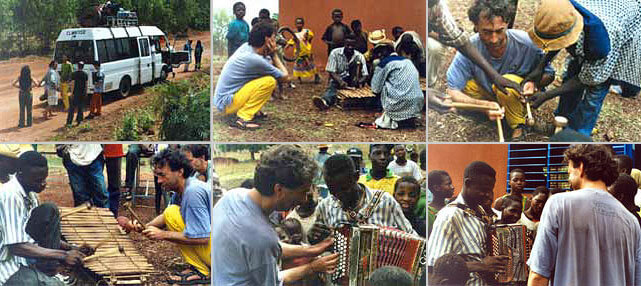GRENZENLOS IN AFRICA
Hubert von Goisern in West Africa
 Three stops were planned on Hubert von Goisern and his band's adventure in Africa: the Cape Verde capital city of Praia, Dakar and Burkina Faso. "I want to find friend, look for musical exchange and show the kind of music we play", Hubert explained before the expedition. He succeeded with the very first concert in Praia in front of 4000 people. The absolute high point of the tour was a show in the slums of Dakar. Despite many warnings safety concerns from others, the band played to an enthusiastic and grateful audience. The wish to play together with African musicians was fulfilled as the various musicians taking part presented their own songs and rhythms.
Three stops were planned on Hubert von Goisern and his band's adventure in Africa: the Cape Verde capital city of Praia, Dakar and Burkina Faso. "I want to find friend, look for musical exchange and show the kind of music we play", Hubert explained before the expedition. He succeeded with the very first concert in Praia in front of 4000 people. The absolute high point of the tour was a show in the slums of Dakar. Despite many warnings safety concerns from others, the band played to an enthusiastic and grateful audience. The wish to play together with African musicians was fulfilled as the various musicians taking part presented their own songs and rhythms.
Desire, sea and lifeblood
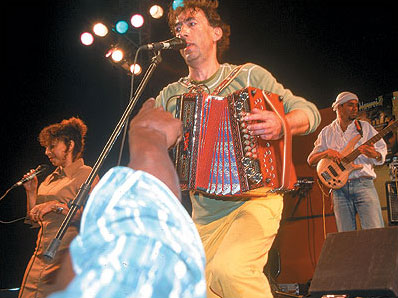
The Cape Verde islands dance African rhythms and sing European melodies. Their capital Praia maintains a cheerful melancholy and is not at all far from Viennese nature
[...] Since Easter 2002 people in Praia have also known the meaning of the word yodelling - Hubert von Goisern was there. Gerhard Überbacher, guitarist in Goisern's band at that time, remembers one of the nights in the lively old town of Praia. "The club was called Tex Mex and had opened especially for us on this day because we wanted to jam with the reggae band of musician Vadu. Through word of mouth it got about and the whole club danced until 5 o'clock in the morning." 20,000 people celebrated at the official concert on the following day, a year later at the huge Gamboa Festival in May, it was 90,000. "Each island has its own rhythm," confirms Tete Alhinho, the solo singer from Simentera, "every Cape Verdian has music in their blood".
"Über d'Alma" under the West African sun
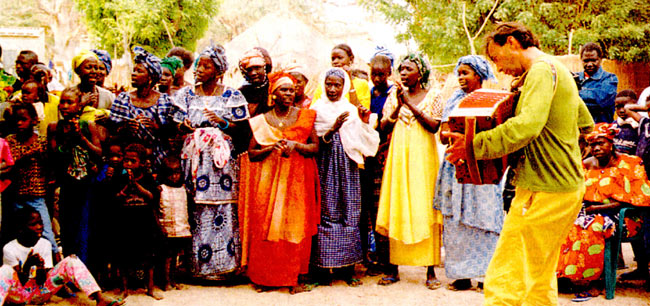
Cultural exchange - Hubert von Goisern and the Hohtraxlecker in Cape Verde
Cape Verde is not Africa and certainly not Europe. A different wind blows here. That is established. Nobody yet knows at the arrival of Hubert von Goisern and his (new) band whether the Cape Verde capital Praia is therefore the ideal starting point for a musical journey through West African countries. Admittedly everyone still carries with them the euphoria of the recent appearances in Egypt in front of 15, 000 enthusiastic fans.
But can such a successful experience be repeated within the shortest time?
Doubts arise: "Why is the stage not standing one day before the concert? Why are there no posters? How many people are coming?"
There are no satisfactory answers. Cape Verde is not only geographically close to Africa, but no doubt mentally too.
And yet: slowly but surely all questions are (mostly self) answered. There are no posters because the rate of illiteracy is 30%. The radio advertising is important and the radio stations have been referring to the event for days: Simentera are celebrating their 10th birthday and are giving a free concert together with the Austrian groups Hubert von Goisern and Hohtraxlecker Sprungschanznmusi.
On the day of the event, the stage is also standing, covered with canvasses and the odd hole. And nevertheless everything which is assembled here seems somewhat improvised, but properly thought-out. It is already gloomy, but the lighting is not yet erected, let alone understood. And yet: for the first appearance, that of the Hohtraxlecker, everything is standing.
Now only people have to come. At 9 o'clock at the advertised start of the concert, the backdrop is thin, perhaps 100 people spread themselves over the enormous area in front of the football stadium.
When the Hohtraxlecker finish playing, the audience has already clearly grown. During Simentera's appearance, the area slowly fills, before finally at about 11pm, Hubert von Goisern and his band step onto the stage in front of a backdrop of a good 4,000 spectators.
And the atmosphere for which they provide is unique: people spring up onto the stage and dance along, the individual songs are clapped to. Car drivers who are travelling on the nearby road take part in the concert, honking their horns.
Memories of Egypt are faint and nevertheless it is a tremendous evening.
Encouraging start for the journey
Tété Alhinho from the group Simentera comes onto the stage and sings über d'Alma together with Hubert. The concert lasts one and a half hours, which should be a worthy and encouraging beginning for the Africa trip.
Hubert has to sign autographs and receives a row of compliments ("Bono, bono, you are Bono Vox"). Why did he got to Africa? "I want to make friends, search for musical exchange and show what music we make."
It is already successful with the first concert - for that was the first station of a 3 week journey through Africa.
Everyone who has a voice should sing!
Cultural exchange: Hubert von Goisern & Co. in West Africa
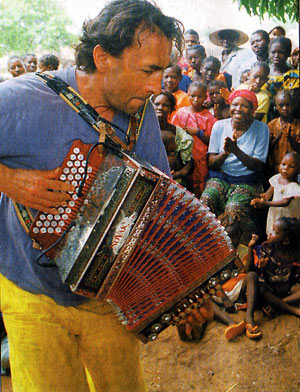 Africa is not just a geographical concept, but also an attitude,
a mentality. That also means that a good many who stay fourteen days in Africa
possibly still do not catch on.
Africa is not just a geographical concept, but also an attitude,
a mentality. That also means that a good many who stay fourteen days in Africa
possibly still do not catch on.
"Yes, now we are in Africa," assesses Hubert von Goisern after five days in Senegal. While Cape Verde is culturally a cross between Europe and Africa, Hubert feels he has "arrived in Africa" is Dakar.
Even if he has to quickly remark that the statement "that is simply Africa" often serves as an excuse that the respective opponent does not want to do anything. The concert in the Sorano Theatre in Dakar, one of the most outstanding concert halls of the continent, especially falls into this category: terrible sound system, a grandly expressed unhappy programme arrangement (Hubert: "At first I thought, well, that suits the taste of the Senegalese, until people here also told me how weak they thought the programme was. The Culture Minister would have had the presenter arrested if he had been able to!") and the lowest attendance (250 to 300 people).
Only: in hindsight, this concert also had a positive effect - effusive critics in the newspapers, a euphoric report on TV should have made Hubert famous in the whole of Senegal, and perhaps a less disinterested public than it had perhaps seemed at first.
Africa has very many faces
A friendship also developed with Oumou Sy, fashion designer as well as internet pioneer who opened the first internet café in Dakar and propagated the internet access for Africa. Personalities like Oumou Sy, who will give a report this year at the Ars Electronica, are the positive face of Africa.
He came to West Africa with no expectations, Hubert should repeatedly emphasise. But the others, the new band, have expectations, mostly very concrete, but above all also the accompanying journalists. Musical meetings, daily great moments, they have obviously expected. Only that Hubert is not fulfilling expectations in himself, the fellow passengers must quickly find that out - provided they had arrived in Africa.
Instead he often preferred the examination of the social situations and visited one or other of the development cooperation projects. And exactly from these from time to time not exactly comprehensible steps have developed the lasting, vivid impressions and also provides for getting to know Africa from its "other" side ... to feel it. One time, contrary to many warnings, the band played a spontaneous concert in the poor district of Rail in the middle of Dakar with a view of the mosque. Admittedly nobody had really known what he was letting himself in for. And one can also easily be brave afterwards. So honestly: Hubert and band did not go through this concert without thoughts about their safety.
Ex-mayor Rudi Graf, Ebensee
But being brave or having to prove something to someone was also not the motive for it. The people gratefully accepted this offer. And it was a spirit which gave the musicians and listeners a soul, like in Assiut: also here the people were starved and longed for a cultural meeting like this. And countless African musicians from traditional music to rappers joined the Austrian musicians and played together with them.
The other time though, out of lethargy, the travelling group swept their visit into a village near the town of Thies, in which the Austrian organisation EWA is active around the former Ebensee mayor Rudi Graf. Hubert played his accordion in front of and with the women of the village. The villagers thought the rhythms of such folk songs as Stadltür and Rote Wand were very fast. "Alle die a Stimm haben, soll'n singa, all die koane haben, sollen tanzen" ("All those who have a voice should sing, all those who don't should dance") it says in the lyrics to Hubert's new song Afrika.
28th July, Bad Ischl and the spirit of Ouagadougou
Cultural exchange: Grenzenlos is the motto of the current Hubert von Goisern tour
Someone actually sits in the French Culture Centre in Ouagadougou, the capital of Burkina Faso, and cries "Hiatamadl". The man has more: he knows the lyrics by heart, he learned them about eight years ago when he studied in Germany. Admittedly there was no Hiatamadl, but instead a liberating, rousing concert - a compact band, a duet of Katholisch with the local star Bilaka Kora, who brought himself to the top act of the "Land of the Incorruptible" (yes, that is the translation of Burkina Faso) with his Djongo music.
Standing ovations in Ouagadougou and calls of "plus, plus" ("more, more"). Nothing explains better with which mood - with the audience as well the participants on stage - ended not only the concert in Ouaga, but a three week tour. Three weeks with morale highs and lows, with hits below the belt, but above all lasting impression and experiences. Such like this last - for the time being - concert in Africa.
Yet the five day stay in Burkina Faso began rather badly: arrival at 5am after the flight from Dakar was delayed several times for hours. A slightly annoyed travelling group refused to continue their journey into Sembla country, wanting to sleep first. "You can try it. Only with this heat, nobody can sleep past 6.30am!" The argument counts. A little later the thermometer shows 46° Celsius and all are happy to catch a seemingly cool breeze in the bus with the windows open (the air conditioning does not work even though the driver insists that it does).
Bobo Dioulasso is the first destination and Bouende, a Sembla village. The Sambla are a tribe who communicate with each other not only through the spoken word, but also with music, played on the balaphone In the villages there is no electricity, no roads between the villages. A walk is on the agenda, only broken by a downpour.
The night is spent on the floor, pests allow the least sleeping. The millet beer brewed in the village also does not make people tired. The tiredness shows through at the concert in Bobo the next day. An hour before the start a sandstorm comes near and the equipment has to be dismantled in its entirety - and later put up again after the storm drifts past. In the tired atmosphere the protagonists do not notice at all how excitingly the ensemble playing with the native group Farafina Ilemba, an acoustic and with lots of percussion, balaphone and two singers, works.
"Burkina? I do not want to go to Burkina!" stresses bass player Toni Porto a week before and buys a ticket to - Dakar. He is able to be persuaded to stay. And is - like everyone else - surprised what a positive aura Burkina Faso offers: friendly people on one hand, much greener than expected, almost Mediterranean - only the sea is missing. And it is mango time: the fruits are waiting to be picked and eaten.
Tour finale on 28th July in Bad Ischl
The last concert will take place in Bad Ischl: on 28th July in the Lehartheater, intentionally held in the small setting as a desired reminder of the "spirit of Ouagadougou".
Musical cooperation North-South: Hubert von Goisern and Bil Aka Kora in concert
Austrian cooperation in Burkina, on 14th April 2002 the French culture centre and Radio Pulsar offers you an unedited concert which consecrates the musical marriage between the north and the south, traditional songs and the sonority of modern music. On stage Bil Aka Kora will demonstrate the strength of his "Djongo system" and Hubert von Goisern will help you discover his alpine music. But who is this Austrian musician who is mingling with our African melodies?
Do you know Hubert von Goisern? Certainly not. Nevertheless, this Austrian is the flag-bearer for a daring musical cross-breeding, a scholarly marriage of traditional songs and modern music. It is quite simple, he is unique in Austria and his concerts play to full houses in his own country as well as Germany and Switzerland. Today Hubert von Goisern is one of the best ambassadors for world music, with a rich vein of traditional sounds from all continents. Obviously it has taken time, energy as well as faith and perseverance on the part of the artist to arrive at this point.
Born in 1952 in the idyllic town of Bad Goisern, Hubert first played trumpet in a traditional band. But he had to stop because the leader of the band did not like his long hair. Then his love of the guitar clashed with the indifference of the population of Bad Goisern, who found the instrument noisy and not at all aesthetic. Sad and frustrated, he moved with his wife to Canada, where he lived for some years. Next he went to Asia, and then to the Philippines where he discovered and learnt to play several traditional instruments, like the nose flute for example. But Hubert von Goisern did not forget the music of his country. "There are marvellous places elsewhere, but nothing can be quite so good as in one's own country," he confesses, before adding "If you think people in your own country are complicated, you discover that it is no different in other places."
Our man then returns to Austria and learns to play the accordion, a traditional Austrian instrument. He also sings traditional songs which he does his best to modernise. To get here he moved to Vienna and worked with the musician Wolfgang Staribacher in a duo called Die Alpinkatzen. From the difference between the two men a musical style is born, alpine music, a marriage of the city sounds of Wolfgang and the mountain background of Hubert. But success did not come immediately. The two men separated and Hubert von Goisern began to search for new musicians. He had to wait until 1991 and a great deal of work to finally carry along the enthusiasm of population.
Since then, successes multiply. Paris, New York, Texas ... adore the bewitching charm of this alpine music, very subtle successfully synthesised traditional songs and jazz, blues and rock melodies. One even finds traditional African music on his Gombe CD, where he inscribed his rich musical experiences of the dark continent.
One understands that this outstanding artist is dying to appear on an African stage. The rendezvous is already set. It is planned for 14th April 2002 at the Georges Méliès French culture centre in Ouagadougou. Alongside Hubert von Goisern, one will have the good fortune to sample the new titles from Bil Aka Kora, the darling of music lovers in Burkina and who himself also makes a beautiful synthesis between traditional and modern. One might as well say, that on this day the alpine cat will court our national Djongo, in a general transport of world music.
Yodelling at the limits in Africa
Hubert von Goisern and his band without a name toured through West Africa. A journey accelerating into slowness
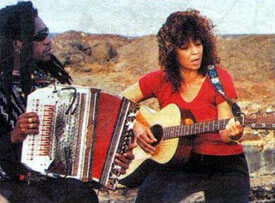
Ferro Gaita and Simentera singer Tete Alhinho
Prologue
Adventurer. Sometimes a rum and a Toblerone are also needed to withstand the Africa adventure. Hubert von Goisern has at least tried it, as our colleague Annelies Pichler found out on the tour with his band. She was travelling with the musician train for three weeks and was able to be astounded, also like unbelieving school children, about how good yodelling sounds for example in Cape Verde.
Bitta likes to cook. While they follow all Hubert von Goisern's movements with the handheld camera, swing onto the band and then aim at the audience again, position themselves right at the back of the audience, here in Ouagadougou, Burkina Faso, in the middle of Africa, the question about the recipe of the German film team Bitta Börger and Oliver Bauer: how much sweetness, sourness, spiciness, saltiness, bitterness, bubbliness is stored in the film material? What will fall in the witch's cauldron of the cutting room?
It is the day before the return home after three weeks in Africa: Cape Verde, Senegal and Burkina Faso. Musician in search of harmony.
Flashback. Cape Verde, the beginning of a journey in the deceptive slowness of Africa. Lost islands outside the west coast, beauties which the Portuguese colonists once forced themselves upon in order to transport slaves. Whoever lived here dreamed of somewhere else. The island kept people short: barely any water, little vegetation and the rough sea refused to be intimate with the fishermen themselves. But in the music lies the lightheartedness of those who have nothing to lose.
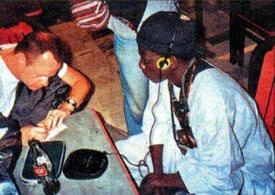
Gerhard Überbacher and Magou
Quick cut. And yodel. Pupils of the school, a showpiece project of the Austrian development collaboration, are staring at Hubert von Goisern. The children politely refrain from bursting into laughter. But how? No chance, the exotic foreigner confronts the giggles. And sympathy.
Hubert's "boys" sound completely different in the night without their frontman in the capital Praia. They cause a stir in the Tex Mex pub with no yodelling at all. "Funky stuff as they have never known it," explains the guitarist from Graz, Gerhard Überbacher. The audience reaction gives a foretaste of the von Goisern appearance in front of the football stadium in Praia.
The party packs the 300 head audience in no time. As soon as the songs become calmer, what is there as a desire to dance fights, thinned out into aggression. In Austria, the security would probably take brutal action, but here other members of the audience suffocate the fury in sympathetic embraces.
Main act Dakar, Senegal. Undeterred, Hubert wants to go into the Africa of millions: into the slums. "The concert in the poor district arose almost spontaneously. Against the resistance of everyone we know in Africa. 'Don't play after sunset! It is dangerous there,' they drummed into us, until I then warned Hubert myself: "Look, that is not said without reason, we must play quickly before it gets dark"," described Bernd Bechtloff. For years he has not only been singer in his band Seven Ages, but also percussionist for the Goiserer. But this time Hubert simply did not let him make an impression: "Dangerous, ah".
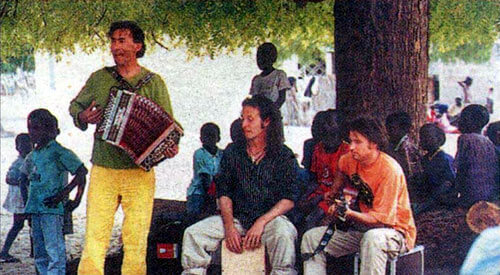
Village concert: Hubert von Goisern, Bernd Bechtloff and Hannes Peithner
The 50 year old would rather have left it to his own judgment despite all the warnings. After all he lived in Africa for four years when he was much younger, at that time when he was still earning money as a specialist for charcoal and graphite for artists and fenced his futile war against the mechanism of the apartheid regime. An East Africa tour was added later.
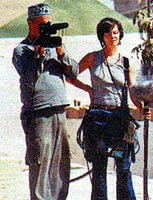
TV team
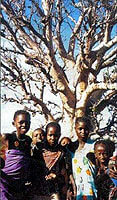
Beneath a monkey bread tree
As the concert in the poor district began, the sun went down and the atmosphere went up. Again and again musicians from the audience played their place freely on stage, more and more Hubert's sounds opened the others until the curious end: We Are The World. Then a quick departure. In a flash the world without music is immediately less round.
"Senegal is the most energetic on the trip. Since there it is like being knocked over by a barrel," the band explain. In the Maison Yes recording studio, which was also the musician's hotel, Magou was brought into it. "He is a star, but he does now know it yet," enthused the Brazilian bass player Antonio Porto about the singer and percussionist who comes from an island outside Dakar. "One night he drummed with our drummer. That was pure magic and just like a little balcony session," says Bitta, the specialist for keeping magic alive on film.
"What should we learn from the music here? I want to find friends. Exchange happens from person to person, not from music to music," Hubert Achleitner alias Hubert von Goisern wants to assure Senegalese press representatives.
In Africa, where the pace gets slower, the present longer and life ever more unpredictable longer, he wants to find a friend and at the same time keep to the tight tour plan? "It was Hubert's dream that we should come here. And like in a dream, everything can happen," says Porto, whose own nightmare in Dakar had almost sent him home again: "It was the side-effect of the malaria prophylaxis, the Lariam. A depression. I then replaced it with a different medication."
But in Hubert's dream appears Oumou Sy, fashion designer. After another concert in Dakar "she stormed backstage and flung her arms around my neck. Unbelievably I found a sister," says an overwhelmed Hubert.
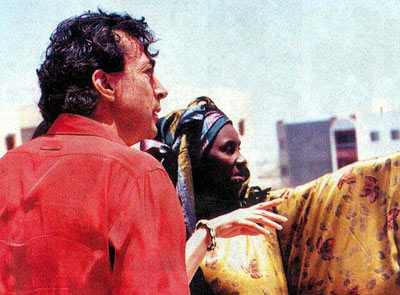
Hubert von Goisern and Oumou Sy
Although the 49 year old is illiterate, apart from many social projects, as the first she brought the Internet to Senegal. For a long time the mother of five has been a moral institution. "We stood there like farm boys - and she the Queen," the Austrians are flabbergasted.
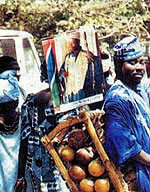
Balaphone player
The hot phase. "Ten hours waiting time at the airport in Dakar, the flight to Ouagadougou, Burkina Faso, then eight wearing hours in the bus on the way to Bobo Dioulasso, after that putting up the sound system and then giving a concert. In any other context it would have been inconceivable," groaned Hubert's co-producer Wolfgang Spannberger. "No sleep, barely any strength, but headache at 35° C. That brings a crazy dynamic," Bitta broods days later after the objective. Fast rhythms, dances to them - barefoot, exact and powerful evens out each strain.
Excursion into Bouende village, where the 300 residents of the Sambla uphold their musical tradition. Here the principle of the school is in force. That is to say: Whoever wants to be a musician must serve their apprenticeship as a young child under their parents. "That partly brings tremendous virtuosity," keyboard player Burkhard Frauenlob is rewarded with the night on the floor of the Sambla huts. And Hubert, who also lets out his yodel in Bouende. This time there is no chortling, but to make up, laughter with slaps on the back.
Somewhere between the exhaustion and lucid daydream the musicians give their crowning farewell concert in Ouagadougou. And their companion on the Afro-goodbye also still torments the Goiserer withdrawal. "Our new CD is coming soon," appeases Spannberger. Let us hope so.
Hubert von Goisern's Africa tour
Prelude in Egypt. 17,000 spectators cheer Hubert von Goisern in the Nile Theatre in Assiut. They experienced a good concert and the premiere of their new programme in the current 2002 lineup. After a week's break in Austria, the formation flies to Africa.
Beyond home
Hubert von Goisern was travelling through West Africa with his band for three weeks. He ran into crossroads where for a short moment, uniting emotions could grow despite the inequality of the world
Sand and sweat and dust run under the T-shirt and over the back. What I would give now for the buzz of the ventilator which has otherwise annoyed me for days and what first for the cooling roar of the sea at home?! These days home means a hotel in which my rucksack stands. Or there, where ambassador Michael Brunner provides a surprise: Zipfer Beer in cans. Lukewarm. Spat out at home. Here, in a dusty place in the middle of Dakar, the opening of a can releases an individual homely feeling - and that in the middle of children's big eyes and pleading, dirty hands. We are standing at one of those dangerous crossroads of current pop culture where totally separate worlds can apparently effortlessly clash.
After the stuffiest dust of the day, a cool night wraps up the 3 million Moloch Dakar. For a short moment the events of the night allow thoughts that all inequality could be dissolved. The concert on the narrow street in the middle of the poor district in the capital of Senegal ended half an hour ago. The curiosity of the residents turns into a wild racket despite the unfamiliar sounds and incomprehensible words.
Dancing between corrugated iron huts
It gets ever closer, hotter. With each song the audience between the corrugate iron huts crowds nearer to the musicians. Yodelling African teenagers, a choir of children's voices, broad smiles and inviting open eyes, which on the basis of the spatial situation make the removal of the eternal rift between "those above" and "those below" easier. Everyone was exhausted, but there were happy faces. Hubert von Goisern sang better. The band played more exact entries, can be shown much better than here. That does not matter in a moment where the cultural exchange gives rise to mutual emotions and releases the globalisation of strengthened inequality from the economic idols.
At the crossroads in the poor district, the frontier-crossing emotions release every intellectual thought. Here the brain stops working. For a few minutes the truth of the heart rules. Even We Are The World, quite strangely struck up by local musicians who had already played along before, lost its awkwardness and became a statement for exchange with the same rights.
Hubert von Goisern and band are bringing their mixture of pop and folk culture to West Africa on a three week tour. As a countermove, the widely travelled Goiserer hopes for inspiration and usable sound material for the next CD. Three weeks which place the highest demands on inner composure. Adventure camp for musical adults who want to present "alpine world music", to form and strengthen this not just through musical stimuli beyond normal routine and - as emphasised - hard practice, to grow together in a new arrangement for the summer tour through familiar territory.
In these familiar territories between cathedral squares and multipurpose halls, the functioning of the band shows a special level of civilisation. Hierarchy, order and organisation first make free development possible, permit those trips which are reached in the evening in the poor district. For a moment, the abolition of world order is a success.
In contrast to regulations and rational behaviour stands what can be experiences travelling abroad. "Nomads are uncivilised, and all the words which are traditionally applied to them are burdened with the prejudices of the civilised world," writes civilisation critic Bruce Chatwin and refers to words such as "tramp" and "vagabond", but which get a legendary meaning in modern music history.
Only the dissolution of the rules of civilisation, the realisation of nomadic virtues open heart and brain for discovery, surprise and amazement - to get ready, to foresee the crossroads where it is worth standing, staying and learning and playing music.
Three weeks in Africa, three countries, five fixed and a few vainly hoped for concerts, torn between the exploration of the unknown, official invitations and the different demands inside one beyond the stage above all in hindsight in view of the "point of the journey" little homogeneous music group. Time is an extremely precious commodity, sleep a side effect and the inner centre a fickle something. "The difference between travellers and holidaymakers lies in time," writes Paul Bowles in Sky Over The Desert. The travelling Hubert Achleitner dozes in the bus and snoozes. He may possibly be more absorbed in this conflict than his music-making alter ego Hubert von Goisern.
The latter must always try to see that a clear direction is found at the various, band-related crossroads too, and so everything goes to plan and is fun.
Still four hours until Ouagadougou - roughly. Which means: about six hours until the start of the last concert of the tour in the French Culture Institute. Burkina Faso is flat and hot and friendly. The bus is slow. Everyone is worn out. The intellectual and physical limits of receptiveness are exhausted. Three days ago we - completely overtired due to a several hour delay of our flight from Dakar - were on this road going the other way to Bobo Dioulasso. The concert in the Culture Institute there let the feet sleep. In Ouaga everything works the best.
All roads lead away and home again
Tiredness, being overloaded with new impression and the forthcoming flight home probably also mobilise all strength. A musically outstanding concert, but simply a quite normal stage and audience bathed in light.
At the last crossroads of the journey, no road leads to a new country, but remains brave in the well-worn lane of the Western culture industry. Here on the stage of the amphitheatre entertaining things happen beautifully, atmospheric and cheered things, but nothing out of the ordinary. Here in a world of pop-isation of dialects and tradition no cultural rift can be dissolved. A member of the audience cries that he wants to hear Hiatamadl. He studied in Trier at the beginning of the 90s and is now living at home in Ouaga again. "...es san die selben Straß'n, die di hoamführ'n oda fort" ("It's the same roads which lead you home or away") says a Goiserer lyric.
Photos from West Africa

Hubert von Goisern in West Africa - March/April 2002
Photo: © Fritz Kalteis
Hubert von Goisern in West Africa - March/April 2002
Photo: © Fritz Kalteis
Hubert von Goisern in West Africa - March/April 2002
Photo: © Fritz Kalteis
Hubert von Goisern in West Africa - March/April 2002
Photo: © Fritz Kalteis
Hubert von Goisern in West Africa - March/April 2002
Photo: © Fritz Kalteis
Hubert von Goisern in West Africa - March/April 2002
Photo: © Fritz Kalteis
Hubert von Goisern in West Africa - March/April 2002
Photo: © Fritz Kalteis
Hubert von Goisern in West Africa - March/April 2002
Photo: © Fritz Kalteis
Hubert von Goisern in West Africa - March/April 2002
Photo: © Fritz Kalteis
Hubert von Goisern in West Africa - March/April 2002
Photo: © Fritz KalteisA Goiserer in Africa
Hubert von Goisern flew to Africa, chasing a dream. He did not reach it. But it was a failure with a pure heart. Report from a 3 week search for the musical meeting. Or: groove from the frogs.
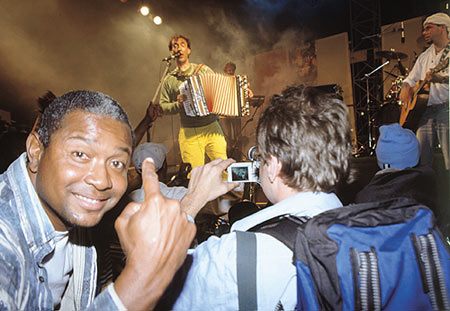 We will only breathe African air for a few more hours, before
the aeroplane will take us from the dry heat of Burkina Faso, just as quickly
as it spat us out here. A low table in the courtyard of the French Culture
Institute in Ouagadougou, the capital of Burkina Faso. Behind the musicians
is the soundcheck for the immediately following final concert, in front of
them lies a copy of a German magazine. Burkhard Frauenlob, the keyboarder
in Hubert von Goisern's band, glances through the pages. "God Wanted
It" is written there. "That fits somehow," says Burkhard,
and tears the fat letters from the magazine. As if a dam had been broken,
the others join in the cheerful search for headlines. Drummer Bernhard Wimmer
tears out "In Case of Despair" from the pages. Percussionist Bernd
Bechtloff snatches "The Principle of Hope" and "Resolute in
Ruin" goes to the violinist and guitarist Gerhard Überbacher. Hubert
von Goisern and bass player Antonio Porto share "It's Over". Three
weeks in Africa summarised in five sentences.
We will only breathe African air for a few more hours, before
the aeroplane will take us from the dry heat of Burkina Faso, just as quickly
as it spat us out here. A low table in the courtyard of the French Culture
Institute in Ouagadougou, the capital of Burkina Faso. Behind the musicians
is the soundcheck for the immediately following final concert, in front of
them lies a copy of a German magazine. Burkhard Frauenlob, the keyboarder
in Hubert von Goisern's band, glances through the pages. "God Wanted
It" is written there. "That fits somehow," says Burkhard,
and tears the fat letters from the magazine. As if a dam had been broken,
the others join in the cheerful search for headlines. Drummer Bernhard Wimmer
tears out "In Case of Despair" from the pages. Percussionist Bernd
Bechtloff snatches "The Principle of Hope" and "Resolute in
Ruin" goes to the violinist and guitarist Gerhard Überbacher. Hubert
von Goisern and bass player Antonio Porto share "It's Over". Three
weeks in Africa summarised in five sentences.
It was a big idea that Hubert von Goisern had in his luggage, as he set off into the south: 3 weeks of sessions and concerts with native musicians in Cape Verde, Senegal and Burkina Faso. "I have fulfilled a long-held dream," says HvG and in his head dance the pictures of Senegal, the epicentre of the West Africa music scene and Dakar, the melting pot of drum rhythms, pop culture and hip hop. Youssou N'Dour, Baaba Maal and Falon Dieng - names which sound like Austria.
Hubert von Goisern proved that alpine music gets on well with music from Africa and Tibet with his albums Gombe and Inexil. One asks what he hopes for from this journey, he speaks of a musical meeting which will bear fruit sometime. He speaks in the singular: "The real meeting always happens between two people. Six people with six people is completely different. The personal side matters, where two people meet and understand each other."
And so the wish for deep musical meetings cannot be fulfilled. Torn between project visits, long bus transfers, hotels, flights, soundchecks, interview appointments, official occasions, the wish for peace and the different interests of six musicians, two camera people and three journalists navigates through West Africa. The leisure of absorbing the nature of the different countries and their music, scarcely appears. Nevertheless, they are there, the great moments.
Heaven and hell is sometimes a question of definition. Count Steven Töteberg, studio owner in Dakar paints hell in gloomy colours. Accordingly, we would feel right in the middle of it. Hell is called Quarter Rail and is a poor district in Dakar. The shacks stand close together here, in which the prospectless people under the 3 million inhabitant city sleep, cook, survive. Corrugate iron, roofing felt and wobbly wooden stilts build a patchwork which has the sense to offer protection from the sun and rain. No electricity, no water, no hope. This is exactly where Hubert has it in his head to give a concert.
Applause, applause, applause
The Count is at his wits' end because with the onset of darkness, the pack of hounds will certainly assassinate us and steal the last cable. He is wrong - the people shower the band with love and praise. "Applause, applause" the presenter of the evening chants the only German word he knows. With wide eyes, he leads the pulsating crowd of smiling children, dancing women and clapping men who throng thicker and thicker around the musicians. Again and again the locals climb to the microphone and turn out to be gifted musicians. A small man drags himself on crutches onto the absent stage. He sings as if Bob Marley is personally whispering to him, his whole body rocking and a panoramic smile on his face. "For me music is a language that goes through the heart. Musicians talk to each other with their instruments and their voices. And if that happens, then it is a feeling of world harmony, then the world becomes smaller and bigger at the same time." So Hubert von Goisern described the magic of playing music together at the beginning of the journey. Now the words become action: We Are The World sung by dozens of different voices. A kitschy-beautiful high point of an unbelievable evening. By the way: not one single cable was lost.
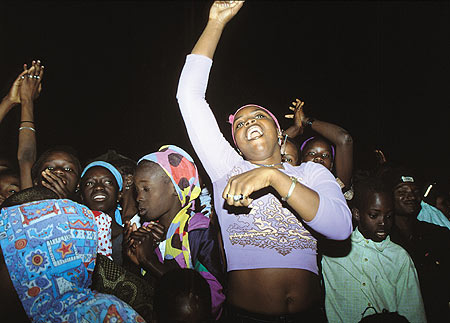 Just 24 hours later Hubert von Goisern is thrown into a hell
of red velvet. Just this moment the concert in the Sorano Theatre has come
to an end. A disaster, in that respect everyone is agreed. The band have
to fight hard with an infernally bad sound system. Hubert is cross: "It
is not the point to meet somewhere in the middle and accept bad sound. In
certain things you have to simply assert yourself." And: "If you
push at the borders of your own tolerance, it is very thrilling. Only in
the moment where you are doing it, it is not very funny." So a blasé,
disinterested audience of 200 people from Dakar's high society sees an unenthusiastic,
depressed band. The normal people remain in front of the door: 4000 Colonial
Francs entrance (with an average wage of 40,000 CFA) and the exclusive areas
deter them.
Just 24 hours later Hubert von Goisern is thrown into a hell
of red velvet. Just this moment the concert in the Sorano Theatre has come
to an end. A disaster, in that respect everyone is agreed. The band have
to fight hard with an infernally bad sound system. Hubert is cross: "It
is not the point to meet somewhere in the middle and accept bad sound. In
certain things you have to simply assert yourself." And: "If you
push at the borders of your own tolerance, it is very thrilling. Only in
the moment where you are doing it, it is not very funny." So a blasé,
disinterested audience of 200 people from Dakar's high society sees an unenthusiastic,
depressed band. The normal people remain in front of the door: 4000 Colonial
Francs entrance (with an average wage of 40,000 CFA) and the exclusive areas
deter them.
Where no cable reaches
The normal people live there where the asphalt streets finished a long time ago, and the electricity cables do not find their way there. Between projecting umbrella thorns and the thickset monkey bread trees a small cluster of thatched huts grow from the earth - Ndioukhane. A village like many in Africa: children, who trail over from the well water, women at the saucepans, the men in front of the omnipresent mosques. And yet Ndioukhane is different. The Austrian EZA have started a women's project here, which means that the women of the village can buy materials with little credits, dye them, decorate them with wonderful batik patterns and sell them. Money for the families with which they can buy medicines and makes the daily fight for survival a bit easier. For in the poorest countries in the world - as which Cape Verde, Senegal and Burkina Faso all rank - between water holes, making fires, grinding millet, cooking and nursing children, little time remains for big future plans. Help in this way makes sense. No matter whether a school in Cape Verde, a trade initiative in Senegal or one for processing mangoes in Burkina Faso - everywhere the initiative is there before the money. "I really like what happens. They are good people with a good attitude ... I have met no cynics. There are people who certainly also do things wrongly, but that is not a reason to do nothing." The visit to the individual projects may have been exhausting for Hubert von Goisern. But it was worthwhile. It is quite possible that in the future, Gri, the singing storyteller from Ndioukhane will tell about the day the yodelling white people came.
A Landler (country dance) is and remains music from a distant world for a Senegalese person and Hubert and Co. have achieved great laughter at every appearance with yodelling. People, they have never seen before, they cannot communicate with, sing Gstanzl together. The whole village cheers and dances, one better, one worse, Hubert laments: "At home people only dance if it is their job, music is almost only played if there is an audience there for it. This naturalness that music and dance have here is wonderful."
Frog palaver
Dakar in spring is only allowed a few moments in which the northwest trade wind does not furiously shake straw roofs and ruffle hairstyles. Just in such a moment, HvG strolled by with his sound technician and a sound recorder to a dark grassy patch full of banana plants and shrubs which had hitherto scarcely attracted attention. Music pours from from the spots of meadow as if from another word. Thousands of frogs have gathered together in a palaver. Croooaaak, croak - multiplied to an animal cacophony, unordered, without harmony. But with each moment the sounds seem to overlap a little more as if the sounds centre. Suddenly the rhythm was born: the frogs grooved together. Musicians must also groove together. The Goisern Collective is first successful on the last day of the journey, at the very last concert in Ouagadougou. Hubert stands on stage with local reggae hero Bill Aka Kora. Together they improvise. And suddenly the funk is there. Lifeblood, enthusiasm, joy, everything that has been missing until now. The yodel echoes back from the audience hundredfold. Bass player Antonio plucks, violinist Gerhard fiddles, drummer Bernhard works with his hands, keyboarder Burkhard conjures, percussionist Bernd springs and everyone has a smile all over their face - at last. And for the first time, at least for the first time in Africa, "Zugabe!" ("Encore!") resounds from the audience.
Islands without harmony
Hubert von Goisern, currently travelling, sharpens his senses
RCT-FM rumbles from the loudspeakers onto the cobbled streets through Praia. Marriages, deaths and also the names of those who have not paid their bills are on the programme. Several times every day an advertisement runs for the appearance of the "grupo austriaco". There are no posters. 30% of the population of Cape Verde, about 500km west of Africa, are illiterate. The radio plays an immense cultural role. No comparison with the formatted triviality at home.
But that is exactly what the reconnaissance tour is about. Breaking down. Foreseeing. Recognising. Absorbing. Getting involved. Like previously in Tibet, India or East Africa, Hubert von Goisern is going slowly through the new world. Until the middle of April, after Cape Verde stations will be Senegal and Burkina Faso. Music permanently accompanies him, but is no constraint whatsoever. What is, is, even if it is not always certain in this region. Once a session there, then a yodel in a school or a spontaneous appearance with befriended musicians. Nomadism in emotional sounds.
"I want to sharpen my senses on journeys," says Goisern about his thirst for meetings. Musical exchange, intensive contact and conversations arise by themselves." Apart from that, we want to show what we have at home for music." The exchange runs with each new world music boom else more one-sided in the opposite direction. So a lot of individual money is invested and it is also lived with that scarcely any financial support came from the official side in Austria. Even more incomprehensible, there on Cape Verde, according to a paper from the foreign office, the cultural collaboration is "yet to develop".
Co-producer and technical manager Wolfgang Spannberger, Goisern's long-standing companion, completes the reason for the journey around the musical components: "Certainly it is also about better assessing the individual status. At home we are always cooking in our own juice. Here there are constantly challenges. But he is not interested in understanding it in the sense of a 'who is better' performance thought, but as an order to open, to allow something new.
The Goiserer's music lays the foundations of Nomadism. He completes expeditions through diverse regions, letting them flow in again and again, without ever leaving out the individual origin. The problem is that each civilisation is based on regulations. "It is also about discarding automatism," says Goisern. Patterns of Western tours and everyday life would not only fail here, they would lead to an organisational catastrophe.
But above all it is about "An avoidance of each uniformity". Instead to impose a so-called better "world picture", it is necessary to emphasise the differences, to profess a belief that does not disturb what is different.
After sunset on Friday evening the radio spots and the soundcheck, which can be heard throughout the town show their effect. The area in front of the football stadium begins to slowly fill up. Four light cross beams tower above the stage. They seem like the far distant skyscrapers which are still being worked upon late at night. Underneath, the party begins. Still reserved at the beginning, as the Hohtraxlecker Sprungschanznmusi fiddle up. Then Simentera. The group around Mario Lucio is also internationally well-known. As good as everything musically revolves around it and their own music club in Parai. They celebrated their 10 year anniversary with the open air concert.
And then the Goiserer and his band. It went on to midnight and all horizons were dissolved. The band (Bernd Bechtloff, Burkhard Frauenlob, Toninho Porto, Bernhard Wimmer and Gerhard Überbacher) do not let it show that they are playing the programme for only the second time. For the first time Goisern wants to record an album after a tour first. Everything yields. Everything simply comes along. Many of the songs are new and will be released this year. But here anyway nobody knows any of them. Above all the rhythmic songs are happily danced to and cheered. The warmth of the evening mixes with the musical closeness. Shortly after the concert, Fia di is still ringing in ears: "... und wann i mei Liadl sing, tragt's da Wind vielleicht bis zu dir hin, über die Berg und übers Wasser, ganz egal, wo i jetzt bin ..."
Hubert von Goisern: a warm and rhythmic evening
It was rather an agreeable surprise to discover Hubert von Goisern. In the style of Joe Zawinul he gave a culturally rich production, rhythmic and sometimes flirting with what the West calls World Music. And the successful exchanges with Fallou Dieng and others finished by confirming this good impression.
If there is one strong image which should be retained from the Austrian Hubert von Goisern's journey to Senegal, it is to be found in the evening entertainment which he livened up with some Senegalese artists. Not only is it unusual, but it reflects the good feeling which prevailed during the whole show. During Fallou Dieng's performance, Gallo Thiello, in a perfect piece of choreography succeeded in making the whole of the Sorano hall audience dance. The minister of culture and the Austrian ambassador found themselves in the front row of invited guests and in the best place of the dancers.
Having been accused of being a little late in starting, the evening of exchanges between Hubert von Goisern and the Senegalese artists - who were Fallou Dieng and his group, Mbaye Dièye Faye and the Sing Sing Rhythm and Magou - had been, to general surprise, an excellent and very convivial evening. And the surprise for the Senegal public, a good many of whom were discovering the Austrian musician for the first time, was the warmth which came out from Hubert von Goisern's music. His style cannot be ranked in the category of classical music, quite the contrary. The music concocted by Hubert von Goisern is certainly full of rhythm. With varied tones sometimes going into salsa or reggae. At some moments the Sorano audience was treated to sounds reminiscent of the mbalax rhythm.
If some people had believed, seeing Mbaye Dièye Faye on the programme, that the accredited percussionist of Youssou Ndour was going to perform in the register of his last production they were quickly disillusioned. Because with the Sing Sing Rhythm, Mbaye Dièye Faye was able to make limited use of percussion. In the traditional pure form, all types of percussion were represented. With the majority being large caisses and tumbas. Seeing Mbaye Dièye Faye and his brothers performing on the Sorano stage, one understands better the success of this art form in the international plane. It is quite simply impressive. Mbaye Dièye for some moments was even allowed to beat time with the backs of his fingers. The audience was enlightened about the differences between the percussion instruments which is a long way from being obvious to an amateur and even less so to a novice.
One of the good moments of the evening was the performance of young Magou. With a superb deep voice, this young man intends to make his mark in folk style. And he has the potential, it only need for him to put a lot more rigour and professionalism into the plan of the musical and lyrical arrangements.
As for Fallou Dieng, who had the honour of closing this dream evening for all amateurs waiting for discovery, he stayed true to himself. He understood the ambience. Even if in this case he did not have much time because of the lateness of the hour. But the little he did show largely sufficed to honour his reputation. And during the performance of Hubert von Goisern and his group he was able to demonstrate to all the spectators that he remained the professional who could move in several styles. In two encores he jammed with the Austrian artist and his music. And Hubert von Goisern knows what he is saying, maintaining that "this evening in Dakar will remain in my memory as one of the powerful moments of my career."
The one who had the honour of beginning the evening was also assured of his share at the end. The comedian Kousta gave no respite to an audience which did not expect his appearance on the scene. And his funny stories, punctuated with impersonations seduced the colourful audience.
A musical exchange at Sorano: rhythm from Austria and Senegal
This Friday the national Daniel Sorano theatre will accommodate a very rich spectacle. Rich in the cultural value of the event and also in the rhythm that will be at the heart of the production. The musician and cultural actor Austrian Hubert von Goisern, on tour in West Africa, will introduce himself this evening at the Daniel Sorano. And to ensure a certain popularity at the show, Senegal artists like Fallou Dieng and his group, Mnaye Dièye Faye and the Sing-Sing Rhythm, comedian Koutia and the young talent Magou will be there.
At a press conference last Wednesday at the premises of the Austrian embassy, Hubert von Goisern affirmed that he had planned his tour to West Africa himself, but in addition to that, this tour was made possible by finance of up to 30 million Francs Cfa.
As for Senegal, the Austrian artist is convinced that Dakar passes for the capital of African music. And principally for this reason, the Dakar stage could not be left out of his programme. Then after Cape Verde, Senegal will welcome this Austrian artist, who is adept at intercultural experiences. This before Burkina Faso takes over from next Wednesday.
In this way with the support of Austrian ambassador and the Austrian Institute for Development and Co-operation, it is possible today to come and draw from the source of rhythm for, as he himself confesses, he loves rhythm and that is the basis of African music. But he could not be content with CDs and so on.
Regarding the choice of Senegal artists, an initial list was made on which, apart from those going to appear, were found Ndongo Lô and Salam Diallo. But it was after several meetings for discussion that a final choice decided the Senegal artists who would appear. And Fallou Dieng at the time of this press conference, promised to give his best at the evening because "it will be an important exchange for the experience of our group."

